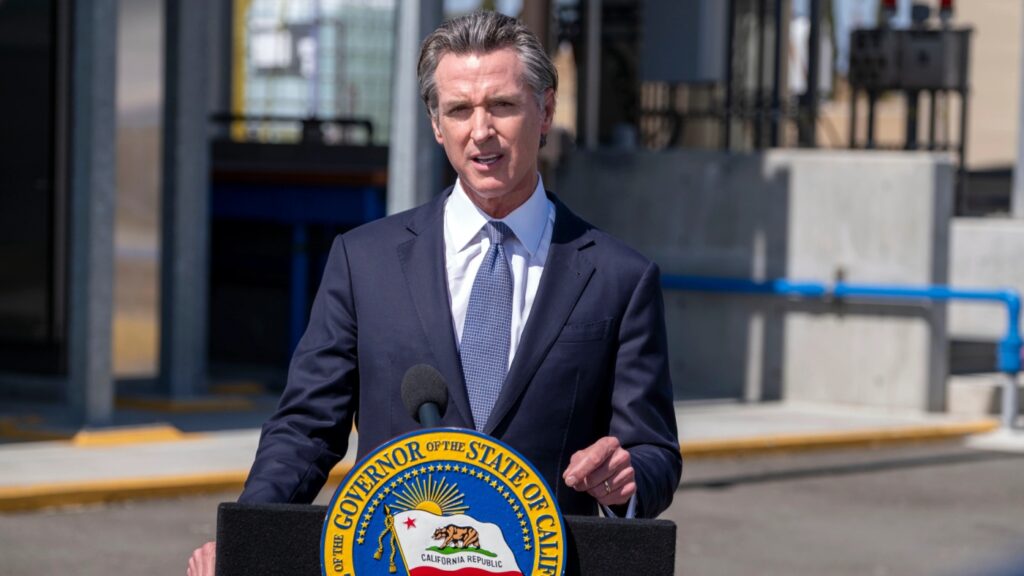
If you don’t make enough money to afford a car, the state of California will pay you $1,000 per year for not having a car.
That’s the substance of Senate Bill 457 by Senator Anthony Portantino, D-Glendale. The bill was passed by the state legislature on the last day of the session and it’s now sitting on Gov. Gavin Newsom’s desk.
“Besides being a source of climate pollution, single occupancy vehicles are also a leading cause of death, injuries and health problems,” Portantino said, as quoted in the bill analysis prepared for the legislature.
Some people might say single occupancy vehicles are a way to get to work and earn a living, enabling the government to collect taxes from paychecks, and also that they transform into quadruple occupancy vehicles that drive people to school, to doctor’s appointments and on trips to spend money at California businesses.
Portantino doesn’t acknowledge any need for a car in his argument in support of his bill. “SB 457 will incentivize mass mode shift toward sustainable transportation by allowing a credit against the ‘net tax’ in the amount of $1,000 for each household with zero registered vehicles,” he said, according to the bill analysis.
To qualify for the tax credit, which could be paid out as a tax refund check to eligible residents, a taxpayer would need an adjusted gross income of $40,000 or less if filing as an individual, $60,000 or less if filing jointly, as a head of household, or as a surviving spouse. Applicants for the credit would have to self-certify that no one in the household owns a registered vehicle, not even a motorcycle.
To enforce the “no vehicles” qualification, the Department of Motor Vehicles will be required to report taxpayer and vehicle information to the Franchise Tax Board as needed.
The bill makes this $1,000 credit available for each of the next five tax years, starting with 2023.
And, according to the author, these payments will prevent death, injuries and health problems.
If you remember, that was the justification for handing out COVID relief checks in 2020. Just stay home, the government said, and we’ll send you money. To keep everybody healthy.
The policy quickly morphed into repeated financial assistance and then into old-fashioned vote buying.
In August 2021, Gov. Gavin Newsom sent out “Golden State Stimulus” checks of $600 to taxpayers who earned up to $75,000. Taxpayers with dependents received up to $1,100. The checks went out just as the recall election ballots were mailed to voters.
By an absolutely total coincidence, this is about to happen again. Another round of checks will go out to California taxpayers in October, just as the ballots are mailed for the general election on November 8, when Newsom is running for re-election.
This new round of election-timed checks was said to be the result of the state’s massive, record-breaking surplus, but that’s not expected to be an annual occurrence, especially if the economy gets mired in a recession. And COVID is waning as an excuse to send out free money. What’s a politician to do?
Can you guess?
Climate change!
Climate change can be stopped by sending your tax dollars to people who are doing things to stop climate change! Like not owning a car!
Climate doom may be the new COVID pandemic, an easy justification for sending free money from the state treasury to targeted voter groups.
Of course, Portantino isn’t saying that. He and other lawmakers are asserting that getting rid of cars is genuinely essential to stop climate change. For this pose, they’re being rewarded with glowing coverage in the Washington Post. “While Americans love their cars, California has adopted a radical strategy aimed at changing their minds, passing a first-of-its-kind bill Wednesday to reward low-income residents who live car-free,” the Post exulted after SB 457 went to the governor’s desk. The paper reported that Newsom “is expected to sign it.”
Even Newsom’s 2020 executive order setting a “goal” of a total ban on the sale of gas-powered cars in the state by 2035 pays lip service to the idea that if enough money is spent, Californians won’t need cars at all, and this will save the world from dying in an Al Gore documentary.
“Passenger rail, transit, bicycle and pedestrian infrastructure, and micro-mobility options are critical components to the State achieving carbon neutrality and connecting communities, requiring coordination of investments and work with all levels of governments including rail and transit agencies to support these mobility options,” the executive order declares.
Related Articles
Trump lacks principle on record search
Controller Betty Yee refused to open California’s books, so we did it ourselves
Proposition 19 a bust on funding new Fire Response Fund
An American in Europe courting the idea of a queen
Mar-a-Lago raid and the principle of equality under the law
Oddly, Newsom cited COVID-19 as a reason for banning the sale of gas-powered cars. “Whereas the COVID-19 pandemic has disrupted the entire transportation sector, bringing a sharp decline in demand for fuels and adversely impacting public transportation,” the order states in paragraph 3.
Did the governor invoke COVID-19 as a justification for this climate-change executive order because that brought it within his powers under the COVID-19 state of emergency?
Under state law, once the state of emergency ends, all executive orders issued under it are null and void.
Maybe the governor will never allow the state of emergency to end. Maybe the state treasury will just be emptied out to targeted voters whenever ballots are mailed and nobody will complain about anything. What could possibly go wrong?
Just one thing. To paraphrase the late British prime minister Margaret Thatcher, the problem with California government is that you eventually run out of other people’s money.
Write Susan@SusanShelley.com and follow her on Twitter @Susan_Shelley
